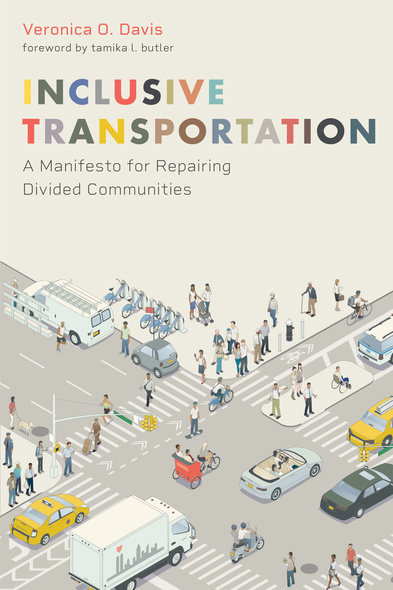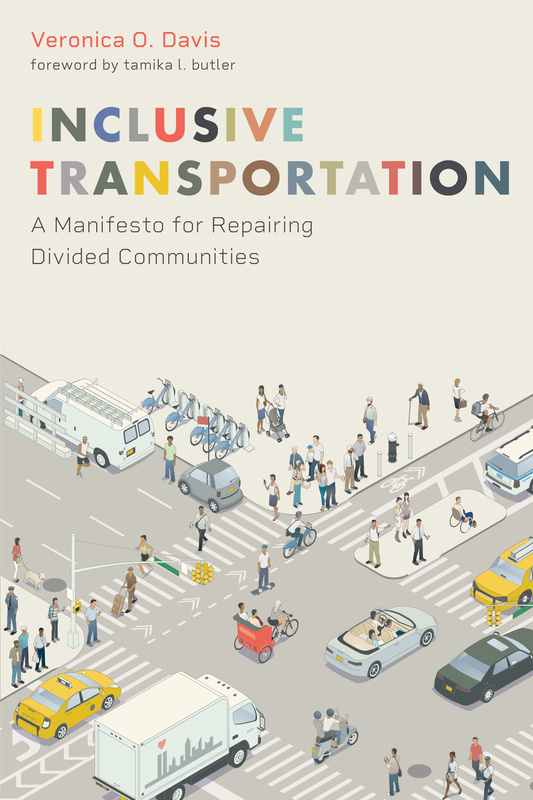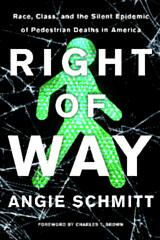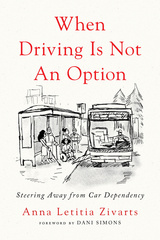Inclusive Transportation
A Manifesto for Repairing Divided Communities
By Veronica Davis; Foreword by tamika l. butler
Island Press
Transportation planners, engineers, and policymakers in the US face the monumental task of righting the wrongs of their predecessors while charting the course for the next generation. This task requires empathy while pushing against forces in the industry that are resistant to change. How do you change a system that was never designed to be equitable? How do you change a system that continues to divide communities and cede to the automobile?
In Inclusive Transportation: A Manifesto for Repairing Divided Communities, transportation expert Veronica O. Davis shines a light on the inequitable and often destructive practice of transportation planning and engineering. She calls for new thinking and more diverse leadership to create transportation networks that connect people to jobs, education, opportunities, and to each other.
Inclusive Transportation is a vision for change and a new era of transportation planning. Davis explains why centering people in transportation decisions requires a great shift in how transportation planners and engineers are trained, how they communicate, the kind of data they collect, and how they work as professional teams. She examines what “equity” means for a transportation project, which is central to changing how we approach and solve problems to create something safer, better, and more useful for all people.
Davis aims to disrupt the status quo of the transportation industry. She urges transportation professionals to reflect on past injustices and elevate current practice to do the hard work that results in more than an idea and a catchphrase.
Inclusive Transportation is a call to action and a practical approach to reconnecting and shaping communities based on principles of justice and equity.
In Inclusive Transportation: A Manifesto for Repairing Divided Communities, transportation expert Veronica O. Davis shines a light on the inequitable and often destructive practice of transportation planning and engineering. She calls for new thinking and more diverse leadership to create transportation networks that connect people to jobs, education, opportunities, and to each other.
Inclusive Transportation is a vision for change and a new era of transportation planning. Davis explains why centering people in transportation decisions requires a great shift in how transportation planners and engineers are trained, how they communicate, the kind of data they collect, and how they work as professional teams. She examines what “equity” means for a transportation project, which is central to changing how we approach and solve problems to create something safer, better, and more useful for all people.
Davis aims to disrupt the status quo of the transportation industry. She urges transportation professionals to reflect on past injustices and elevate current practice to do the hard work that results in more than an idea and a catchphrase.
Inclusive Transportation is a call to action and a practical approach to reconnecting and shaping communities based on principles of justice and equity.
With decades of experience as an engineer and planner, Davis understands the transportation industry. Proficient in both the technical and public engagement aspects of the planning process, she shares valuable lessons learned, poses questions for consideration within projects and plans, and provides recommendations for making systemic changes to the industry….As a call to action, this book would benefit decision-makers and planning and engineering practitioners who are frustrated with and interested in addressing the harms caused by the status quo of the transportation planning process.
A call to action and a practical approach to reconnecting and shaping communities based on principles of justice and equity. Exceptionally well written, organized and presented, Inclusive Transportation is a seminal and ground-breaking contribution to planning for American 21st century transportation needs and will be of special and particular value to readers with an interest in mass transit and urban planning.
Casually written, this is an enthusiastic and idealistic introduction to the participatory politics of planning meant to elevate consciousness and encourage action.
In the US, our transportation system is at the root of some of our biggest inequities. Ever wonder why some neighborhoods get all the pollution, have the most dangerous, high-speed streets, and the longest travel times to job centers and daily needs? Veronica O. Davis breaks it down for you and shares her transportation project battle scars. Read this book if you’re a current or aspiring practitioner who works in any field that touches on public investment decisions, AND if you are a neighborhood advocate – you’ll learn where and how to push for change.
This book joins the chorus of the many Black professionals who have been asking their peers to engage in new ways of thinking, listening, and governing. Most important, it does so by offering concrete advice that planners and allied professionals can take to assess their own privilege, interrogate power, and actively shift those dynamics in their work. I hope those leaders, as well as scholars, students, and anyone interested in justice, read this manifesto for repairing divided communities. I feel changed by reading Veronica’s book. I hope you feel the same. Open the book, get started on, or continue, your justice journey, and when you finish, make a commitment to do more than just talk about equity.
Veronica O. Davis, PE, is the Director of Transportation & Drainage Operations, Houston Public Works. Veronica has nearly 20 years of experience in engineering and transportation planning. She co-founded Black Women Bike and was recognized as a Champion of Change by the White House in 2012 for her professional accomplishments and advocacy. Veronica serves on the committees for Transportation Research Board, the board for America Walks, as well as technical advisory boards at the University of Maryland and Cornell University.
Foreword by tamika l. butler
Preface
Introduction
Chapter 1: Transportation is Personal
Chapter 2: Equity is more than a Baseball Graphic
Chapter 3: Should there be a War on Cars?
Chapter 4: Power, Influence, and the Complexity of People
Chapter 5: Bringing People and Planning Together
Chapter 6: The Task Ahead: Where the Hard Work Continues
Acknowledgments
Notes
About the Author









